
Optica Pura y Aplicada
Scope & Guideline
Advancing the Frontiers of Optical Science
Introduction
Aims and Scopes
- Optical Engineering and Instrumentation:
Research related to the design, development, and application of optical systems and instruments, including spectrometers, cameras, and sensors. - Biomedical Optics and Photonics:
Studies that explore the application of optical technologies in medicine, including photodynamic therapy, imaging techniques, and diagnostics. - Material Science and Nanophotonics:
Research on the optical properties of materials at the nanoscale, including studies on photonic crystals, thin films, and advanced materials for photonic applications. - Optical Theory and Simulations:
Theoretical investigations and computational modeling of optical phenomena, including diffraction, interference, and light-matter interactions. - Education and Outreach in Optics:
Initiatives that promote understanding and engagement with optics and photonics, including educational tools, workshops, and community outreach programs.
Trending and Emerging
- Integration of Photonics in Technology:
A growing emphasis on integrating photonics with technology, particularly in telecommunications, quantum computing, and sensory devices, shows the journal's alignment with current technological advancements. - Women in Optics and Photonics:
Increased publication frequency addressing gender diversity and inclusion in the field indicates a positive trend towards recognizing and supporting women's contributions in optics and photonics. - Machine Learning and AI in Optics:
Research exploring the application of machine learning and artificial intelligence techniques to solve complex problems in optics is emerging, highlighting the intersection of these fields. - Environmental and Health Applications:
There is a notable increase in studies focused on environmental monitoring and health-related applications of optics, showcasing the journal's responsiveness to global challenges. - Advanced Imaging Techniques:
Emerging interest in sophisticated imaging methods, such as hyperspectral imaging and digital holography, suggests a trend towards enhancing image capture and analysis in various applications.
Declining or Waning
- Historical Studies in Optics:
Papers focusing on the historical development of optics and its pioneers have seen a decline, suggesting a shift towards more contemporary applications and technologies. - Basic Optical Experiments and Demonstrations:
There is a noticeable reduction in publications centered on basic optical experiments, which may reflect a growing emphasis on advanced and applied research rather than educational demonstrations. - Traditional Optical Materials:
Research specifically focused on conventional optical materials (e.g., glass) is becoming less prevalent, indicating a trend towards exploring novel materials with enhanced properties.
Similar Journals
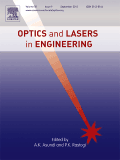
OPTICS AND LASERS IN ENGINEERING
Shaping the Future of Engineering with Optical PrecisionOPTICS AND LASERS IN ENGINEERING, published by Elsevier Science Ltd, is a premier journal dedicated to advancing the field of optics and laser technology in engineering applications. With a robust ISSN of 0143-8166 and E-ISSN 1873-0302, this journal is positioned within the top quartile (Q1) across several categories, including Atomic and Molecular Physics, Electrical Engineering, and Mechanical Engineering as of 2023, showcasing its prestige and impact in the scientific community. The journal has consistently ranked high in Scopus, notably within the top 10% for Mechanical Engineering and Electronic, Optical, and Magnetic Materials research. Since its inception in 1980, OPTICS AND LASERS IN ENGINEERING has served as a vital platform for disseminating cutting-edge research, fostering innovation and collaboration among researchers, professionals, and academia. Though it does not currently offer Open Access options, its high impact factor and selective publication process ensure that articles reach a wide audience while maintaining rigorous academic standards. Researchers and students alike are encouraged to engage with this influential journal to contribute to and stay abreast of advancements in optical technologies and their engineering applications.

Optics Continuum
Transforming Ideas into Optical InnovationsOptics Continuum, published by Optica Publishing Group, is a pioneering open access journal dedicated to advancing the field of optics and photonics. Since its inception in 2022, this journal seeks to provide a vital platform for the dissemination of groundbreaking research and innovative developments across several interconnected domains, including electrical and electronic engineering, atomic and molecular physics, and material sciences focused on electronic, optical, and magnetic materials. With impressive rankings in Scopus—placed #384 in Electrical and Electronic Engineering and #109 in Atomic and Molecular Physics—the journal aims to engage a diverse readership comprised of researchers, professionals, and students, promoting collaboration and knowledge exchange. The journal's open access model ensures that cutting-edge research is readily available to all, nurturing an inclusive academic environment. For those interested in staying at the forefront of optics research, Optics Continuum is an essential resource that continuously enriches the global scientific community.

APPLIED OPTICS
Fostering Excellence in Optical ResearchApplied Optics, published by Optica Publishing Group, is a prestigious journal dedicated to the field of optics and photonics. With an ISSN of 1559-128X and an E-ISSN of 2155-3165, this journal serves as a critical platform for researchers, professionals, and students eager to disseminate innovative findings and advancements in applied optics. Established in 1962, it has maintained a significant presence in the academic community, currently holding a Q2 category ranking in various disciplines including Atomic and Molecular Physics, Electrical and Electronic Engineering, and Miscellaneous Engineering as per the 2023 metrics. The journal's reputation is underscored by its solid Scopus rankings, attesting to its influential research output. While not an open-access journal, it continues to offer vital insights and discussions on the latest research topics that are critical to the advancement of technologies in optics, ensuring accessibility to vital knowledge for those within the field.
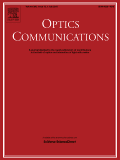
OPTICS COMMUNICATIONS
Unveiling Breakthroughs in Optical ScienceOptics Communications, published by Elsevier, is a prestigious international journal that focuses on the dynamically evolving fields of optics and photonics. With its ISSN 0030-4018 and E-ISSN 1873-0310, this journal has made significant contributions to the fields of Atomic and Molecular Physics, Electrical and Electronic Engineering, Electronic, Optical and Magnetic Materials, and Physical and Theoretical Chemistry, consistently ranking in the Q2 quartile across these categories for 2023. The journal, based in the Netherlands, is recognized for its rigorous peer-review process and aims to publish high-quality research articles that advance knowledge and applications in optical communication technologies. Although it operates under a subscription model, the insightful research published here plays an essential role in informing the work of researchers, professionals, and students alike. With a history dating back to 1969 and spanning well into 2025, Optics Communications remains a crucial resource for cutting-edge developments in optics, catering to a global audience dedicated to innovation in this pivotal science.

Opto-Electronic Advances
Illuminating the Path of Innovative ResearchOpto-Electronic Advances is a premier open-access journal published by the Chinese Academy of Sciences' Institute of Optics & Electronics, dedicated to advancing the fields of optics and electronic engineering. Established in 2018, this journal quickly ascended to a Q1 ranking across multiple categories including Atomic and Molecular Physics, Electrical and Electronic Engineering, and Electronic, Optical and Magnetic Materials, showcasing its impact and relevance in the scientific community. With an impressive Scopus ranking placing it in the top percentiles for critical fields such as Engineering, Materials Science, and Physics, Opto-Electronic Advances provides a platform for researchers to publish their cutting-edge findings and foster dialogue in an increasingly interdisciplinary area of study. The journal emphasizes innovative research that contributes to practical applications and theoretical frameworks in its domain, making it an invaluable resource for academicians, industry practitioners, and students alike. Embrace the future of opto-electronic research with Opto-Electronic Advances, which has been fully open access since 2021, ensuring that knowledge is widely disseminated without barriers.
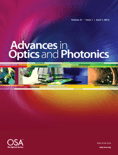
Advances in Optics and Photonics
Transforming Light into KnowledgeAdvances in Optics and Photonics, published by the Optica Publishing Group, stands at the forefront of research dissemination in the fields of Atomic and Molecular Physics and Optics, alongside its prominence in Water Science and Technology. With an impressive Q1 ranking in both categories and a Scopus rank of #2/224, this journal boasts a 99th percentile status, underscoring its significance in the academic community. As a beacon of knowledge since its inception in 2009, the journal is dedicated to featuring cutting-edge research, innovative methodologies, and transformative applications in optics and photonics that can drive advancements across diverse scientific domains. While not an open-access journal, it provides vital insights for researchers, professionals, and students eager to stay updated on emerging trends and breakthroughs. With a convergence period extending to 2024, Advances in Optics and Photonics is positioned as an essential resource for anyone looking to explore the evolving landscape of light-based technologies.
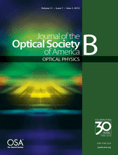
JOURNAL OF THE OPTICAL SOCIETY OF AMERICA B-OPTICAL PHYSICS
Advancing Frontiers in Optical Physics ResearchJOURNAL OF THE OPTICAL SOCIETY OF AMERICA B-OPTICAL PHYSICS, published by Optica Publishing Group, serves as a leading platform for groundbreaking research in the fields of optical physics, atomic and molecular physics, and statistical and nonlinear physics. With an ISSN of 0740-3224 and an E-ISSN of 1520-8540, this esteemed journal has been in circulation since 1984 and is dedicated to advancing the understanding of optical phenomena and related technologies. It holds a commendable position in the academic community, with a 2023 Scopus ranking reflecting its significance—placing it in the top quartile for both Atomic and Molecular Physics and Statistical and Nonlinear Physics. Although it is not an open-access publication, it provides extensive access options to ensure that research is disseminated effectively within the scientific community. This journal is instrumental for researchers, professionals, and students alike, aiming to keep them informed of the latest advancements and trends in optical science. With a convergence of expertise and innovation, JOSA B continues to play a pivotal role in shaping the future of optical research.

Chinese Optics
Exploring the Depths of Optical Science and Technology.Chinese Optics is a premier journal dedicated to advancing the field of optics, encompassing research on atomic and molecular physics. Published by the esteemed Changchun Institute of Optics Fine Mechanics & Physics in China, this journal supports the sharing of cutting-edge findings since its inception in 2010. With an ISSN of 2097-1842, it operates within a competitive landscape, currently positioned in Q3 of the category for Atomic and Molecular Physics and Optics, according to the 2023 metrics. While the journal is not open access, it offers a valuable platform for researchers, professionals, and students to explore and contribute to significant discoveries in the realm of optics and light technology. By fostering scholarly communication, Chinese Optics plays a crucial role in bridging theoretical and practical aspects, making it an indispensable resource for those passionate about the optical sciences.

Nonlinear Optics Quantum Optics-Concepts in Modern Optics
Charting New Territories in Nonlinear and Quantum OpticsNonlinear Optics Quantum Optics-Concepts in Modern Optics is a specialized journal published by OLD CITY PUBLISHING INC, focusing on the forefront of research in nonlinear optics and quantum optics. With an ISSN of 1543-0537 and an E-ISSN of 1944-8325, this journal serves as a pivotal platform for the dissemination of innovative concepts and findings in modern optics, significant for both theoretical exploration and practical applications. Established in 2003, the journal's scope encompasses critical areas such as atomic and molecular physics, optical materials, and instrumentation, attracting submissions from a diverse range of interdisciplinary fields. While the journal currently maintains a Q4 ranking in several categories, it continues to strive for higher visibility and impact in the academic community. Researchers and students alike will find valuable insights and contributions that foster advancements in optical science and engineering. With an emphasis on rigorous peer-review, Nonlinear Optics Quantum Optics-Concepts in Modern Optics is committed to enhancing the understanding and application of nonlinear optical phenomena in various technological domains.
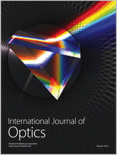
International Journal of Optics
Illuminating the Future of OpticsWelcome to the International Journal of Optics, a distinguished publication dedicated to advancing the field of optics and its interdisciplinary applications. Published by HINDAWI LTD, this open-access journal has been pivotal in fostering knowledge since its inception in 2009. With a robust focus on atomic and molecular physics as well as electronic, optical, and magnetic materials, the journal has carved its niche within Q3 quartile rankings in these categories for 2023, signifying its growing impact and relevance in the scientific community. Researchers and professionals will find a rich repository of innovative and cutting-edge research articles that not only address fundamental aspects of optics but also explore practical applications across various domains. The journal's aim is to promote high-quality research dissemination, enhancing collaboration among scientists and ensuring that pivotal findings reach a global audience. Join us in exploring the dynamic world of optics—where your contributions help shape the future of science.